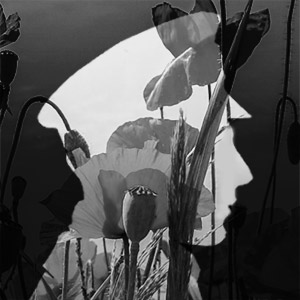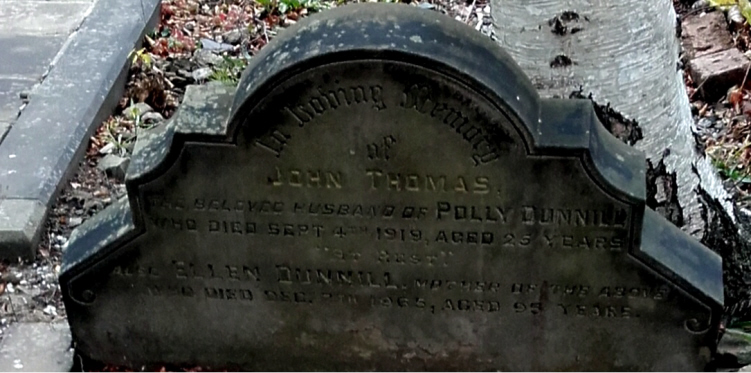
John Thomas Dunnill was born in Glasgow, Scotland in 1894, the first child of bricklayer, Robert Wetherill Dunnill and his wife Ellen (nee Law) who married in 1882. The South Yorkshire couple had six children from their marriage: five boys and one girl. The eldest two children were born in Glasgow in the mid 1890s, but in the late 19th and early 20th Century, it appears the family were seeking work in Surrey and Cheshire, before settling in Ossett sometime before 1905.
By 1911 Ellen Dunnill and her six children aged between 2 and 17 years were living in a three-roomed home at 13, Church Street, Ossett. John Thomas Dunnill, then aged 17 years was working as a twister for a woollen manufacturer. His father, Robert Wetherill Dunnill was not living in the household, but was one of 113 patients, described as ‘inmates’, at the Royal Hospital at Chapel Street, Salford.
John Thomas Dunnill, a 21 year old warper, of Field Head, Church Street, Ossett married Polly Smith of the Beehive Inn, Gawthorpe, at Ossett Holy Trinity Church on the 24th July 1915. A child, Ida Constance Dunnill, was born to the couple on the 10th January 1916.
John Thomas is remembered on the Commemoration Programme for the unveiling of the Ossett War Memorial on the 11th November 1928. He is also mentioned on the Gawthorpe St. Mary’s Roll of Honour now displayed in Holy Trinity Church. A service record for John T. Dunnill does not appear to have survived and since his death from enteric fever occurred after the end of WW1, in September 1919. until recently there has been no Commonwealth War Graves record of his death or any commemoration.
John Thomas Dunnill served as a Driver (Rank of Private) in the Army Service Corps. It is not known when he enlisted but it is known that he was still in service in September 1919 when he died whilst at home on leave. He was awarded the British and Victory medals indicating that he served overseas in a theatre of war. He was not awarded the 1914-15 Star confirming that he did not serve overseas until 1916 or later.
The officers and men of the ASC – sometimes referred to in a joking, disparaging way as “Ally Sloper’s Cavalry” were the unsung heroes of the British Army in the Great War. Soldiers can not fight without food, equipment and ammunition. They can not move without horses or vehicles. It was the ASC’s job to provide them. In the Great War, the vast majority of the supply, maintaining a vast army on many fronts, was supplied from Britain. Using horsed and motor vehicles, railways and waterways, the ASC performed prodigious feats of logistics and were one of the great strengths of organisation by which the war was won. At peak, the ASC numbered 10,547 officers and 315,334 men.

Above: Pension card for John Thomas Dunnill.
John Thomas Dunnill, of 34, High Street, Gawthorpe, Ossett died of enteric fever at his home on 4th September 1919 and was buried at Ossett Holy Trinity Church on the 6th September 1919, aged 25 years. His death certificate records that he was a Driver (262670) A.S.C., & (woollen warper).
On the 4th November 1920, his widow, Polly, of 1 High Street, Gawthorpe, was awarded a war pension of £1 16s. 8d per week for herself and her child, Ida.
Following representations and the submission of evidence on his behalf the Commonwealth War Graves Commission has recognised that his death from enteric fever was contracted whilst on active service and that it was a consequence of his service.
As a result in 2020 the Commonwealth War Graves Commission commemorated John Thomas Dunnill.

Above: The grave of John Thomas Dunnill at Trinity Church, Ossett.
After John Dunnill’s death in 1919, his widow Polly Dunnill married Albert Hemingway in 1921 and the couple went on to live at Ravensthorpe, Dewsbury.
An Ancestry.co.uk Family Tree has photographs of John Dunnill’s widow (near the Station Hotel, Ravensthorpe) and his daughter Ida, but unfortunately none of him.
On the 11th November 2018, John T. Dunnill’s name was unveiled by Ossett school children at the Ossett War Memorial.
Biography amended October 2021
References